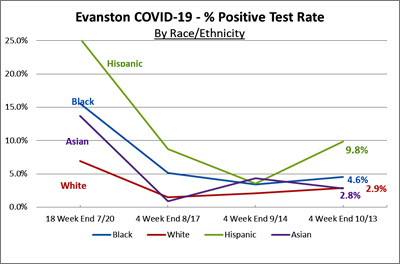Trust In Evanston Tap Water: How Gender, Race, And Past Experiences Shape Perceptions

Table of Contents
Gender and Trust in Evanston Tap Water
Gender roles often play a significant, albeit often unseen, role in shaping attitudes towards water safety and consumption. Women frequently bear the primary responsibility for household water management, including cooking, cleaning, and ensuring the health of their families. This increased involvement often translates to a heightened awareness of water quality issues and a greater concern about potential contaminants.
- Increased Awareness: Women are often more likely to research water quality, report problems, and advocate for improvements to the water infrastructure.
- Risk Perception: Studies indicate women tend to perceive environmental risks, including water contamination, more acutely than men. This heightened sensitivity can lead to a more cautious approach to tap water consumption.
- Trust in Official Sources: Gender may influence how individuals interpret official statements regarding water safety. Women might demand more evidence and transparency before accepting assurances from authorities.
Understanding these gendered perceptions is crucial for building trust and effective communication around Evanston's water system. Further research into gender-specific concerns about Evanston's tap water would provide valuable insights for improving public health communication.
Race and Perceptions of Evanston Tap Water Safety
The issue of trust in Evanston's tap water is further complicated by racial disparities and historical injustices related to access to clean and safe water. Minority communities have historically faced unequal access to clean water resources, and these experiences can significantly shape their trust in public water systems.
- Historical Context: The legacy of environmental racism in the United States, including discriminatory water infrastructure development, continues to affect trust in water systems within marginalized communities.
- Information Disparities: Access to information about water quality testing and reports might vary among different racial groups in Evanston. Language barriers or lack of community outreach can exacerbate these inequalities.
- Community Engagement: Building trust requires proactive community engagement and culturally sensitive communication strategies. This includes providing water quality information in multiple languages and formats, as well as incorporating community feedback in decision-making processes.
To fully understand the relationship between race and trust in Evanston tap water, demographic data on water access, consumption, and concerns within Evanston's diverse communities is crucial. Addressing these systemic inequalities is essential for ensuring equitable access to safe and reliable drinking water for all residents.
Past Experiences and the Shaping of Trust in Evanston's Tap Water
Personal experiences significantly shape perceptions of Evanston's tap water. Past water contamination incidents, even in other locations, negative media coverage, or even anecdotal stories from friends and family can profoundly impact an individual's trust in the local water supply, regardless of official assurances.
- Impact of Past Issues: Any past water quality issues in Evanston, however minor, can create lasting skepticism among residents. Openly acknowledging and addressing these past concerns is essential for rebuilding trust.
- Media Influence: Media reporting, both positive and negative, significantly influences public opinion. Sensationalized reporting of water contamination events, even if geographically distant, can fuel anxieties and distrust.
- Overriding Official Assurances: Personal experiences often outweigh official reassurances from water authorities. Individual narratives and lived experiences play a pivotal role in shaping perceptions of safety and reliability.
To effectively address these concerns, a transparent and responsive approach to communication is essential. Openly sharing information about water quality testing, promptly addressing any issues, and proactively engaging with community concerns are crucial steps in rebuilding trust.
Improving Trust in Evanston Tap Water: Strategies and Solutions
Rebuilding and maintaining trust in Evanston tap water requires a multi-pronged approach focusing on improved communication, transparency, and community engagement.
- Enhanced Communication: Regular and clear communication from water authorities is vital. This includes proactively sharing water quality reports, explaining testing procedures, and addressing community concerns in a timely and accessible manner.
- Proactive Water Quality Testing: Increased frequency and transparency in water quality testing and the readily available publication of results builds confidence in the safety of the water supply.
- Educational Campaigns: Educational campaigns can combat misinformation and address misconceptions about water safety. These campaigns should be tailored to different demographics and community needs.
- Environmental Justice Initiatives: Prioritizing environmental justice initiatives ensures equitable access to information and resources, addressing the concerns of marginalized communities.
By implementing these strategies, Evanston can significantly improve trust in its tap water, ensuring all residents have access to safe and reliable drinking water.
Conclusion: Rebuilding Trust in Evanston Tap Water
This article has explored how gender, race, and past experiences intersect to shape perceptions of trust in Evanston's tap water. Addressing these complex factors requires a holistic approach that prioritizes transparency, community engagement, and environmental justice. Ensuring equitable access to safe and reliable drinking water for all residents is paramount. We urge you to learn more about Evanston's water quality reports, participate in community discussions about water safety, and actively engage with local authorities to build trust in Evanston's tap water. Your voice and engagement are critical in fostering a healthier and more equitable water future for our community. Let's work together to strengthen trust in Evanston tap water.

Featured Posts
-
 Elon Musk And Amber Heard Twins And The Embryo Dispute
May 15, 2025
Elon Musk And Amber Heard Twins And The Embryo Dispute
May 15, 2025 -
 Predicting The Top Baby Names For 2024
May 15, 2025
Predicting The Top Baby Names For 2024
May 15, 2025 -
 Key Provisions Of The House Republicans Trump Tax Plan
May 15, 2025
Key Provisions Of The House Republicans Trump Tax Plan
May 15, 2025 -
 S Jv Sea Match Preview Everything You Need To Know
May 15, 2025
S Jv Sea Match Preview Everything You Need To Know
May 15, 2025 -
 Npo Toezichthouder En Bruins Gesprek Over Leeflang Noodzakelijk
May 15, 2025
Npo Toezichthouder En Bruins Gesprek Over Leeflang Noodzakelijk
May 15, 2025
